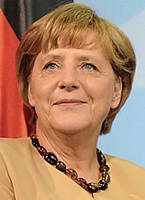Merkel on back foot as far-right AfD makes major gains
14 Mar 2016
Anti-migration party Alternative for Germany (AfD) recorded remarkable gains in Germany's regional elections on Sunday and looks able to break into three more German state parliaments, according to first projections.
 Eligible voters have cast their ballots in the southwestern states of Baden-Wuerttemberg and Rhineland-Palatinate as well as eastern Saxony-Anhalt to elect three new regional parliaments.
Eligible voters have cast their ballots in the southwestern states of Baden-Wuerttemberg and Rhineland-Palatinate as well as eastern Saxony-Anhalt to elect three new regional parliaments.
In Saxony-Anhalt, the AfD made its biggest gains by winning 23 per cent of the vote, showed the projections. In Baden-Wuerttemberg and Rhineland-Palatinate, the party claimed 12.5 per cent and 11 per cent of voter support respectively.
The AfD, which has clearly positioned itself against German Chancellor Angela Merkel's refugee and asylum policy, is able to break into all three state parliaments with remarkable gains.
The so-called "Super Sunday" vote is the biggest since a record number of refugees came to Germany, and is largely billed as a mood test for Merkel's open door policy towards refugees.
The far-right party has dealt the chancellor a blow even as she tries to seal a deal with Turkey to reduce the influx of migrants.
In elections that showed how strongly the refugee crisis has scrambled politics and daily life in Germany, Merkel's centre-right Christian Democrats failed to wrest control of two states in western Germany where they had once been expected to do so.
In the one eastern state that voted, her party finished first. But the AfD, a populist, nationalist party formed in 2013, was only five percentage points behind.
Merkel, now facing the toughest challenges of her political career, had no immediate comment on Sunday. She left that to party lieutenants on television talk shows that spent hours dissecting the muddled outcome of the first big electoral test of Merkel's refugee policy.
Several analysts noted that despite the relatively poor showing by Merkel's party, two governors from other parties who supported her refugee policy had retained their seats. The Green incumbent won in Baden-Württemberg in the southwest, and the Social Democrat won in neighbouring Rhineland-Palatinate.
Ursula von der Leyen, the defence minister and a leading member of Merkel's party, noted the governors' support for the policy while conceding, on a talk show, that the overall outcome was ''a paradox''.
In a telephone interview, Jürgen Falter, a professor of politics at Johannes Gutenberg University in Mainz, told The New York Times the gains in the three state legislatures by the AfD were ''a clear warning shot for Merkel's refugee policy''.
Raising barriers
European leaders announced an agreement this week aimed at stopping the flow of migrants trying to reach Europe through the Balkans. In January and February, more than 123,000 migrants landed in Greece, compared with about 4,600 in the same period last year.
Merkel has no reason to fear for her position, either as party leader or chancellor, he added. She has no serious competitors, and unseating a chancellor is a complex process.
But Sunday's results showed considerable opposition to her policy within Germany. And in Europe, several countries have refused to take in refugees and have closed their borders to migrants, rejecting Merkel's appeal for a unified approach to the challenges posed by the more than one million who have arrived since early 2015.
This week, Merkel hopes to conclude a deal with Turkey to stem the flow. In exchange for European concessions such as visa-free travel for Turks and up to €6 billion, or about $6.7 billion, in aid, Turkey would take back any illegal migrants crossing from its shores to Greece.
But a crackdown on the news media in Turkey, growing clashes between Turks and Kurds, and general violence there - a bombing was reported in Ankara on Sunday - make the deal tough for some European countries to accept.
The chancellor has refused to set limits on the influx, and has argued that Germany and at least some other European countries can afford to shelter those fleeing war and hardship.
Her tone hardened considerably after hundreds of reported sexual assaults by young male migrants on young women in Cologne on New Year's Eve, and as she hit the campaign trail in recent weeks. Yet that ''didn't really do any good'' in terms of the Christian Democrats' showing on Sunday, Professor Falter said.
In all three states, turnout rose considerably, to 70 per cent in the two western states and 61 percent in the eastern state, Saxony-Anhalt.
Frauke Petry, who has spearheaded the advance of the Alternative for Germany, triumphantly proclaimed that her party had rekindled voter interest. ''The voters have turned away from the two big parties in considerable droves,'' she said on the public broadcaster ZDF.
The Alternative for Germany was already in five of Germany's 16 state legislatures, but Sunday's results showed its new strength. The party won 15.1 per cent of the vote in Baden-Württemberg and 12.6 percent in Rhineland-Palatinate, according to official results, and 24 per cent in Saxony-Anhalt, according to projections by ARD and ZDF television.
In all three states, the showing by the new party illustrated the decline of the traditional parties. They have rejected any coalition with Alternative for Germany, but excluding it makes it harder to form majorities to govern.



















